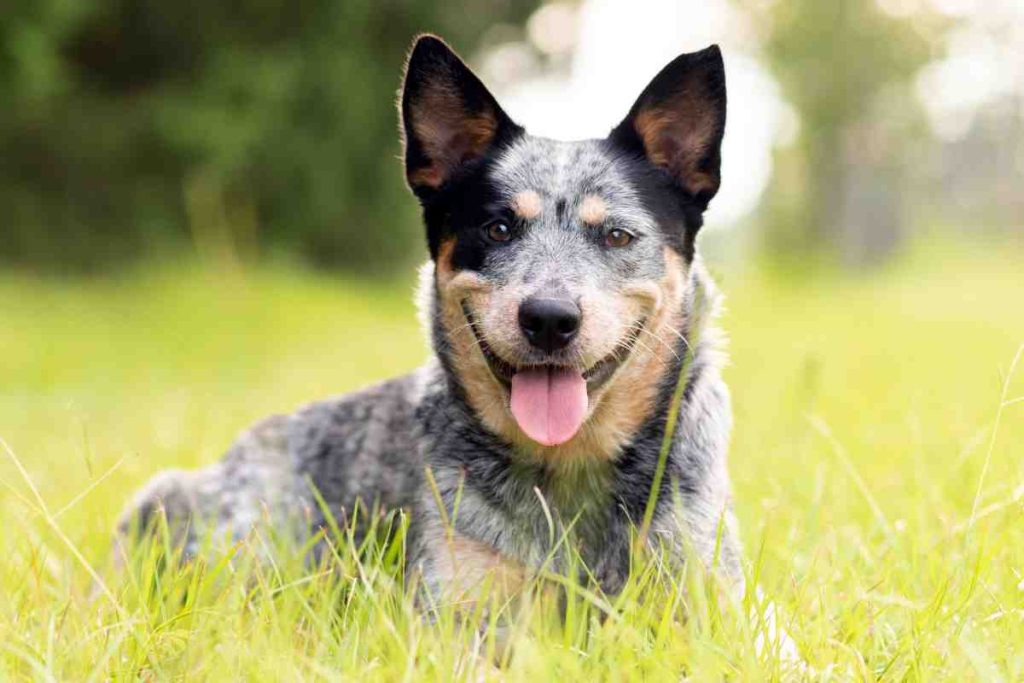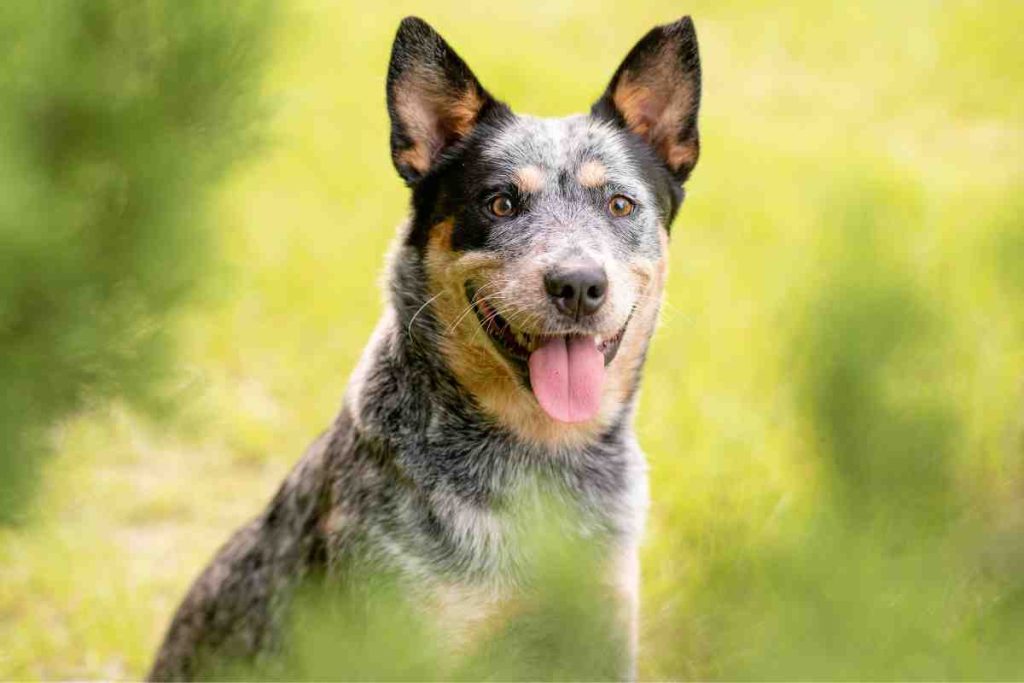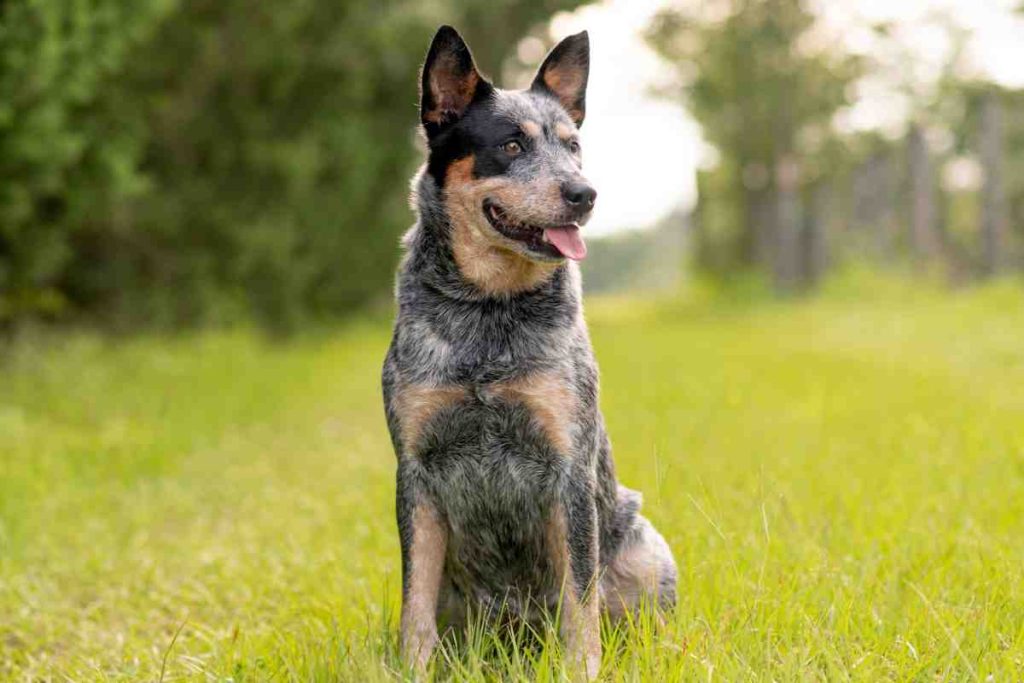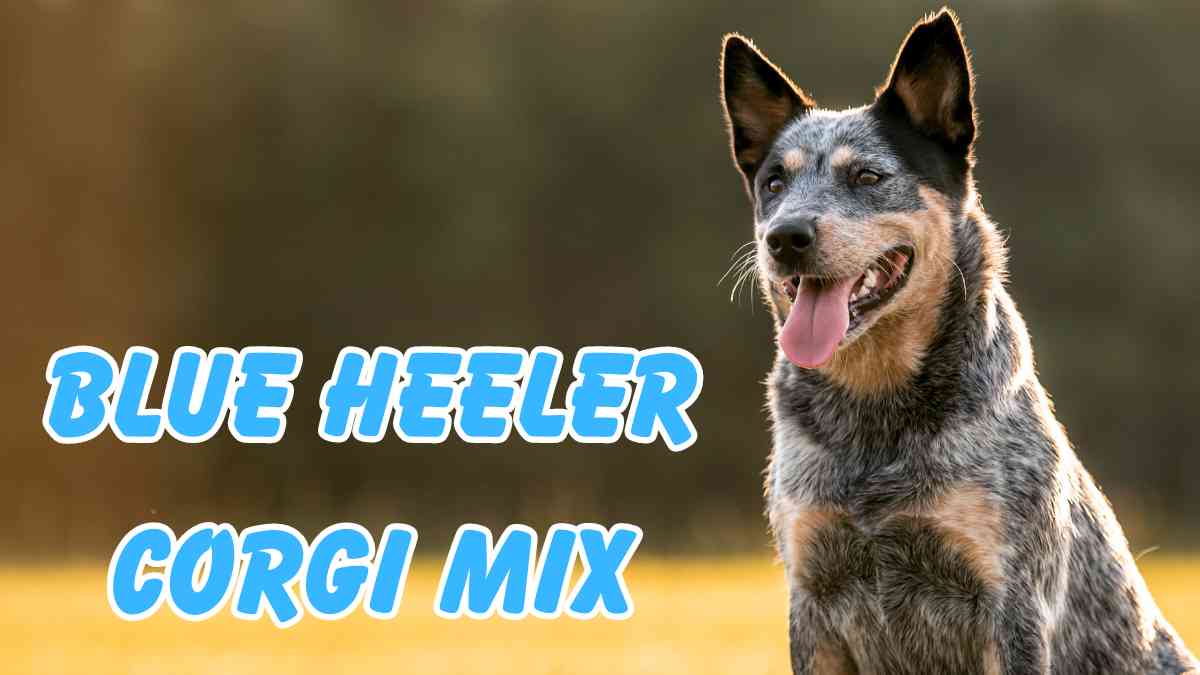The Blue Heeler Corgi Mix, often referred to as the Cowboy Corgi, is a captivating hybrid breed that combines the intelligence of the Blue Heeler and the charm of the Corgi. This unique mix results in a medium-sized dog that boasts a sturdy build and a striking appearance.
Blue Heeler Corgi Mix Breed Overview
| Characteristic | Information |
|---|---|
| Origin and History | The Cowboy Corgi is a crossbreed between a Blue Heeler and a Corgi, combining the herding prowess of both breeds. The exact origin is not well-documented, but it likely emerged in recent decades. |
| Common Names | Cowboy Corgi, Blue Heeler Corgi Mix |
| Size and Weight Range | Medium-sized; typically ranging from 25 to 50 pounds. |
| Coat Colors and Patterns | Varied, including but not limited to blue merle, red, black, and white, often with distinct markings and patterns. |
| Temperament | Intelligent, loyal, energetic, and playful, embodying the best qualities of both parent breeds. Known for being excellent herders and companions. |
| Suitable Living Environments | Adaptable to various living conditions; thrive in homes with yards where they can expend their energy. Suitable for both urban and rural settings. |
| Compatibility with Children | Generally good; Cowboy Corgis are known for their friendly nature and often form strong bonds with children. Supervision is recommended, as with any dog breed. |
| Exercise Requirements | High energy levels; require regular exercise and mental stimulation to prevent boredom. Daily walks, playtime, and interactive activities are essential. |
| Grooming Needs | Moderate grooming needs; regular brushing to manage the coat, occasional baths, and attention to ears and nails. |
| Lifespan | Typically around 12 to 15 years, provided with proper care and a healthy lifestyle. |
| Price Range for Puppies | Prices vary based on factors such as breeder reputation, lineage, and location. Generally, expect to pay between $500 to $1,500 for a Cowboy Corgi puppy. |
What is a Cowboy Corgi?
A Cowboy Corgi is a delightful hybrid breed resulting from the crossbreeding of a Blue Heeler and a Corgi. This unique blend combines the intelligence and herding instincts of the Blue Heeler with the charming demeanor of the Corgi. Also known as the Blue Heeler Corgi Mix, these dogs exhibit a distinctive appearance, often showcasing a medium size, sturdy build, and a variety of coat colors and patterns.
Renowned for their agility and intelligence, Cowboy Corgis make excellent working dogs and companions. They are characterized by their energetic and playful nature, embodying the best traits of both parent breeds. Their adaptability makes them suitable for various living environments, whether in urban or rural settings. As loyal and affectionate pets, Cowboy Corgis tend to form strong bonds with their owners, making them ideal family members.

What is the physical appearance of Blue Heeler Corgi Mix?
The physical appearance of a Cowboy Corgi is a delightful combination of the distinct features inherited from its Blue Heeler and Corgi parentage. Here’s a closer look at the key aspects of their appearance:
Size and Build
Cowboy Corgis typically exhibit a medium-sized build, with a sturdy and well-proportioned frame. Their height generally ranges from 12 to 17 inches at the shoulder, and they weigh between 25 to 50 pounds.
Coat Colors and Patterns
One of the most visually striking aspects of the Cowboy Corgi is its coat diversity. These dogs come in various colors, including blue merle, red, black, and white. The coat may feature distinct patterns and markings, adding to their overall charm.
Body Structure
These dogs often inherit the elongated body and short legs characteristic of the Corgi parent, along with the muscular build of the Blue Heeler. Their tails can vary, with some individuals having a natural bobtail, while others may have a longer tail.
Facial Features
Cowboy Corgis typically boast expressive eyes and alert, triangular-shaped ears that may stand erect. The facial expression is often intelligent and friendly, reflecting their amiable nature.
Overall Impression
In summary, the Cowboy Corgi presents a harmonious blend of the distinctive traits of both parent breeds. Their physical appearance is not only aesthetically pleasing but also functional, aligning with their historical roles as herding and working dogs. The combination of a sturdy build, diverse coat colors, and expressive features contributes to the undeniable charm of the Blue Heeler Corgi Mix.
What are the personality traits of Blue Heeler Corgi Mix?
The Cowboy Corgi’s personality is a captivating mix of the intelligence, loyalty, and energy inherited from its Blue Heeler and Corgi parentage. Understanding the key personality traits of these dogs provides valuable insights for potential owners:
Intelligence
Cowboy Corgis are exceptionally smart dogs, owing to the intelligence of both the Blue Heeler and the Corgi. This trait makes them quick learners, easily adaptable to various training exercises and commands.
Loyal and Affectionate
Known for forming strong bonds with their human companions, Cowboy Corgis are loyal and affectionate. They thrive on human interaction and often develop a deep sense of devotion to their families.
Energetic and Playful
With a lineage deeply rooted in herding, Cowboy Corgis have abundant energy levels. They are playful and enjoy engaging in activities that stimulate both their physical and mental well-being. Regular exercise and playtime are essential to keep them happy.
Alert and Protective
Inheriting the protective instincts of the Blue Heeler, Cowboy Corgis are alert and make excellent watchdogs. They are likely to alert their owners to any perceived threats, making them a reliable choice for those seeking a protective companion.
Sociable
Cowboy Corgis are generally sociable dogs, getting along well with family members, including children and other pets. Proper socialization from an early age helps reinforce positive behaviors and ensures a well-adjusted adult dog.
Independent Thinkers
Their herding background often makes Cowboy Corgis independent thinkers. While this can contribute to their problem-solving abilities, it also requires consistent training to channel their intelligence effectively.
Playful Herding Instinct
The herding instinct is a prominent feature in Cowboy Corgis. They may display playful attempts to herd family members, especially children, showcasing their innate working dog heritage.
Care and Maintenance
Proper care and maintenance are essential to ensure the well-being and happiness of your Cowboy Corgi. Here’s a comprehensive guide to meeting their needs:
Exercise Requirements
Cowboy Corgis have high energy levels inherited from their herding background. Regular exercise is crucial to prevent boredom and promote physical fitness. Aim for at least 30-60 minutes of daily activity, including walks, playtime, and mental stimulation through interactive toys.
Nutrition
Provide a balanced and nutritious diet to support the Cowboy Corgi’s overall health. Choose high-quality dog food appropriate for their size, age, and activity level. Regular feeding schedules and portion control help maintain a healthy weight.
Grooming Needs
While not overly demanding, Cowboy Corgis benefit from regular grooming. Brush their double coat at least once a week to minimize shedding and prevent matting. Bathe them as needed and pay attention to ear cleaning, dental care, and nail trimming.
Mental Stimulation
Keep their intelligent minds engaged by providing mental stimulation. Puzzle toys, interactive games, and obedience training sessions are excellent ways to challenge their intellect and prevent behavioral issues.
Socialization
Early and consistent socialization is vital for Cowboy Corgis. Expose them to various people, environments, and other pets to ensure they develop into well-adjusted and friendly adults. This helps curb any potential shyness or aggression.
Veterinary Care
Regular veterinary check-ups are crucial to monitor the Cowboy Corgi’s health and catch any potential issues early. Stay up-to-date on vaccinations, parasite prevention, and dental care. Discuss specific health considerations with your veterinarian, given the breed’s background.
Training and Leadership
Establish yourself as the pack leader through consistent and positive training methods. Cowboy Corgis respond well to praise and rewards. Basic obedience training helps control their independent streak and fosters a well-behaved companion.
Secure Fencing
Due to their herding instincts, Cowboy Corgis may have a tendency to wander. Ensure your living environment has secure fencing to prevent any escapades. Supervise outdoor activities, especially in unfenced areas.
Husky Corgi Mix
What are the training tips for Blue Heeler Corgi Mix?
Training a Cowboy Corgi can be a rewarding experience given their intelligence and eagerness to learn. Here are effective training tips to help you shape a well-behaved and happy companion:
Start Early
Commence training and socialization early in your Cowboy Corgi’s life. Puppies are more receptive to learning, and early exposure to various experiences helps shape a confident and well-adjusted adult dog.
Positive Reinforcement
Cowboy Corgis respond exceptionally well to positive reinforcement. Use treats, praise, and affection to reward good behavior. This approach not only motivates them but also strengthens the bond between you and your dog.
Consistency is Key
Consistency in commands and expectations is crucial. Use the same cues for specific behaviors, and ensure that all family members apply consistent rules. This helps avoid confusion and reinforces the desired actions.
Obedience Training
Enroll your Cowboy Corgi in obedience classes or conduct training sessions at home. Focus on basic commands such as sit, stay, come, and leash manners. Building a foundation of obedience enhances their responsiveness and makes daily interactions more manageable.
Mental Stimulation
Incorporate mental exercises into their routine to prevent boredom. Puzzle toys, interactive games, and training sessions that challenge their intellect keep them engaged and reduce the likelihood of destructive behaviors.
Leash Training
Given their herding instincts, leash training is essential. Teach them to walk beside you without pulling, reinforcing the concept of you as the leader. Use treats and positive reinforcement to encourage proper leash manners.
Socialization
Expose your Cowboy Corgi to various people, environments, and other animals from a young age. This helps them develop into well-socialized dogs, comfortable in different situations. Positive socialization reduces the risk of fear-based aggression.
Be Patient and Positive
Patience is key during training. If your Cowboy Corgi is struggling with a command, remain calm, and avoid frustration. Negative reactions can hinder the learning process. Celebrate small victories, and make training sessions enjoyable for your dog.
Agility Training
Given their agility and herding background, engage Cowboy Corgis in agility exercises. Set up obstacle courses, tunnels, and jumps to channel their energy and stimulate both their physical and mental abilities.
Time and Attention
Devote quality time to your Cowboy Corgi. They thrive on companionship and are more likely to respond positively to training when they feel connected to you. Regular playtime and bonding contribute to a well-behaved and happy dog.

Health Considerations
Ensuring the health and well-being of your Cowboy Corgi involves attention to various aspects. Here are key health considerations to keep in mind:
Regular Veterinary Check-ups
Schedule regular veterinary visits to monitor your Cowboy Corgi’s overall health. Routine check-ups allow early detection of potential health issues and ensure timely intervention.
Vaccinations and Preventive Care
Stay current on vaccinations and preventive care measures recommended by your veterinarian. This includes protection against common canine diseases, as well as preventive treatments for parasites such as fleas and ticks.
Nutritious Diet
Provide a balanced and age-appropriate diet to meet the nutritional needs of your Cowboy Corgi. Consult with your veterinarian to determine the best diet plan, considering factors like size, age, and activity level.
Weight Management
Maintain a healthy weight for your Cowboy Corgi to prevent obesity-related health issues. Regular exercise, portion control, and a balanced diet contribute to their overall well-being.
Hip Dysplasia and Joint Health
Being a medium-sized breed, Cowboy Corgis may be prone to hip dysplasia. Implement measures to support joint health, such as regular exercise, a proper diet, and joint supplements if recommended by your veterinarian.
Eye Health
Monitor your Cowboy Corgi’s eyes for any signs of irritation, discharge, or cloudiness. Some herding breeds are prone to certain eye conditions, so prompt veterinary attention is crucial if you notice any abnormalities.
Dental Care
Dental health is vital for overall well-being. Establish a routine for brushing your Cowboy Corgi’s teeth, provide dental chews, and schedule professional dental cleanings as recommended by your veterinarian.
Allergies
Watch for signs of allergies, such as itching, redness, or digestive issues. Identifying and addressing allergens early can prevent discomfort and more severe health issues.
Ear Care
Due to their floppy ears, Cowboy Corgis may be prone to ear infections. Regularly check and clean their ears, and seek veterinary attention if you notice signs of infection, such as redness, swelling, or a foul odor.
Spaying/Neutering
Discuss with your veterinarian the appropriate time for spaying or neutering your Cowboy Corgi. This can contribute to better behavior, prevent certain health issues, and control the pet population.
Living with a Blue Heeler Corgi Mix
Living with a Cowboy Corgi can be a rewarding experience, but it requires understanding their unique needs and characteristics. Here’s a guide to fostering a harmonious living environment with your Blue Heeler Corgi Mix:
Energetic Lifestyle
Prepare for an active lifestyle as Cowboy Corgis have high energy levels. Regular exercise, including daily walks, playtime, and mental stimulation, is essential to keep them happy and prevent boredom-related behaviors.
Secure Living Space
Given their herding instincts, ensure a secure living space, especially if you have a yard. Cowboy Corgis may be prone to attempting to herd family members or other pets, so proper fencing is crucial to prevent wandering.
Mental Stimulation
Provide mental stimulation through interactive toys, puzzles, and training sessions. Engage their intelligent minds to prevent boredom, as a stimulated Cowboy Corgi is less likely to exhibit destructive behaviors.
Socialization
Early and consistent socialization is vital. Expose your Cowboy Corgi to various people, environments, and other animals to ensure they grow into well-behaved and confident companions.
Bonding Time
Cowboy Corgis thrive on companionship and bonding with their owners. Spend quality time with your pet through play, walks, and positive interactions to strengthen your relationship.
Training and Leadership
Establish yourself as the pack leader through consistent, positive reinforcement training. Cowboy Corgis respond well to clear commands and praise, and a well-trained dog contributes to a harmonious living environment.
Grooming Routine
Maintain a regular grooming routine to keep your Cowboy Corgi’s coat healthy and minimize shedding. Brush their double coat at least once a week, and pay attention to ear cleaning, dental care, and nail trimming.
Family-Friendly Companions
Cowboy Corgis are generally good with children and other pets when properly socialized. Supervise interactions, especially with small children, to ensure a positive and safe environment for everyone.
Healthcare Routine
Stay vigilant about your Cowboy Corgi’s health. Schedule regular veterinary check-ups, vaccinations, and preventive care. Attend to any signs of discomfort or illness promptly.
Adaptable Living Spaces
Cowboy Corgis are adaptable to various living spaces, whether in urban apartments or rural homes with larger yards. Provide an environment that meets their need for physical activity and mental stimulation.
Blue Heeler Corgi Mix as Family Pets
The Cowboy Corgi, with its unique blend of intelligence, loyalty, and playful nature, makes an excellent addition to a family setting. Here’s why the Blue Heeler Corgi Mix is well-suited as a family pet:
Affectionate and Loyal
Cowboy Corgis form strong bonds with their human family members. Their loyalty and affectionate nature make them devoted companions, providing a sense of security and love within the family.
Playful with Children
Known for being generally good with children, Cowboy Corgis enjoy playful interactions and often become protective of their younger family members. Supervision is essential, as with any dog breed, to ensure positive interactions.
Eager to Please
The intelligence of the Cowboy Corgi contributes to its eagerness to please its owners. This trait makes training sessions enjoyable and effective, fostering a well-behaved pet that can seamlessly integrate into family routines.
Adaptability to Living Spaces
Cowboy Corgis are adaptable to various living environments. Whether in a spacious rural setting or a more confined urban apartment, they can thrive with proper exercise, mental stimulation, and attention from their family members.
Watchful and Protective
Inheriting protective instincts from the Blue Heeler parent, Cowboy Corgis make excellent watchdogs. Their alert nature means they are likely to notify the family of any potential intruders, enhancing the overall security of the household.
Engaging in Family Activities
These dogs enjoy being a part of family activities. Whether it’s a weekend hike, a playdate in the backyard, or a cozy evening at home, Cowboy Corgis thrive on being involved in the daily life of their human pack.
Socialization with Other Pets
When properly socialized from an early age, Cowboy Corgis can coexist harmoniously with other pets in the family. Their friendly nature often extends to furry siblings, creating a cohesive and happy pet environment.
Exercise Partners
Ideal for active families, Cowboy Corgis make excellent exercise partners. Their energy levels and agility mean they can participate in various activities, from running and hiking to agility training, keeping the family active and healthy.
Companionship for All Ages
Cowboy Corgis provide companionship that spans generations. Whether you have children, teenagers, or empty nesters, these adaptable dogs can adjust their energy levels to suit the needs of the entire family.
Unique Personality Traits
The Cowboy Corgi’s mix of the Blue Heeler’s herding instincts and the Corgi’s charm results in a unique personality that can bring joy and laughter to the family. Their playful antics and intelligent behaviors make for entertaining and heartwarming family moments.

Conclusion
In conclusion, the Cowboy Corgi, a delightful blend of the Blue Heeler and Corgi, offers families a unique and affectionate companion. With their intelligence, loyalty, and adaptability, these dogs seamlessly integrate into family life, providing joy to members of all ages.
The Cowboy Corgi’s playful nature, combined with their watchful demeanor, makes them not only great playmates for children but also reliable protectors. As with any pet, consistent care, training, and attention to their specific needs foster a fulfilling relationship. Embracing a Cowboy Corgi as a family pet promises years of companionship, laughter, and cherished moments.
FAQs
What is the size range of a Blue Heeler Corgi Mix?
Cowboy Corgis typically fall into the medium-sized category, with a height ranging from 12 to 17 inches at the shoulder and a weight of 25 to 50 pounds.
How much exercise does a Cowboy Corgi need?
Cowboy Corgis are energetic dogs and require at least 30-60 minutes of daily exercise. Regular walks, playtime, and mental stimulation activities help keep them happy and healthy.
Are Cowboy Corgis good with children?
Yes, Cowboy Corgis are generally good with children. Their playful and affectionate nature makes them excellent companions for families. However, supervision is recommended, especially with younger children.
What is the lifespan of a Blue Heeler Corgi Mix?
The typical lifespan of a Cowboy Corgi ranges from 12 to 15 years with proper care, diet, and regular veterinary check-ups.
How much grooming do Cowboy Corgis require?
Cowboy Corgis have moderate grooming needs. Regular brushing (at least once a week), occasional baths, and attention to ears, nails, and dental care contribute to their overall grooming routine.
